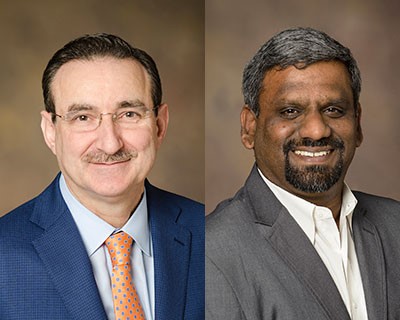
Two highly accomplished researchers in the University of Arizona Department of Medical Imaging, with a long track record of advancing imaging techniques to detect and diagnose breast cancer, receive a new award to develop advanced imaging technology.
Researchers at the University of Arizona Health Sciences are seeking a new and more accurate way to diagnose breast cancer and contribute to improved outcomes for patients worldwide.
Dr. Andrew Karellas and Dr. Srinivasan VedanthamThe National Cancer Institute, part of the National Institutes of Health, recently awarded a $3.6 million, five-year R01 grant to advance the research of Andrew Karellas, PhD, DABR, FAAPM, FACR, and Srinivasan Vedantham, PhD, DABR, FAAPM, professors in the Department of Medical Imaging who share the same passion for detecting breast cancer at its earliest stage.
This latest round of NIH funding enables Drs. Karellas and Vedantham to further improve the identification of cancerous breast tissue. The Biomedical Imaging Innovation and Clinical Translation in Next-Gen CT – or BIG-CT – team will design, develop and clinically evaluate a new generation of breast-specific computerized tomography that will provide 3D images of breast tissue. Their unique patient-positioning design alleviates the need for breast compression that often is painful for patients undergoing mammograms.
More than reducing patient discomfort with breast cancer screening, BIG-CT research aims to provide an accurate estimate of breast density – a known risk factor for breast cancer. The research team also is working to reduce the occurrence of false positives, which require additional exams and biopsies.
The UA researchers anticipate the fully 3D nature of their tomographic images will improve the detection of abnormal findings and quickly allow doctors to determine whether the findings are malignant or noncancerous.
Drs. Karellas and Vedantham are the principal investigators; co-investigators include Kimberly Fitzpatrick, MD (medical imaging); Marisa Borders, MD (medical imaging); Leigh Neumayer, MD, MS, FACS (surgery); Denise Roe, DrPH (epidimeology and biostatistics); and Lauren LeBeau, MD (pathology).
Since their arrival at the UA in 2017, the professors, along with Hsin-Wu Tseng, PhD, have improved the methods for capturing images used for breast cancer imaging. As directors of the BIG-CT research laboratory, Drs. Karellas and Vedantham, also members of the UA Cancer Center, have endeavored to improve the process of breast cancer detection, a disease that affects about 1 in 8 U.S. women.
"The medical imaging research funded by this grant is an area of strength for the University of Arizona, and it is directly aligned with the new strategic plans for the university and the UA Health Sciences," said UA President Robert C. Robbins, MD. "This research to develop new technology for breast cancer imaging, followed by a clinical trial, is a great example of how we should use the university’s strengths as an innovation powerhouse to create positive impact for patients, their families and communities around the world."


